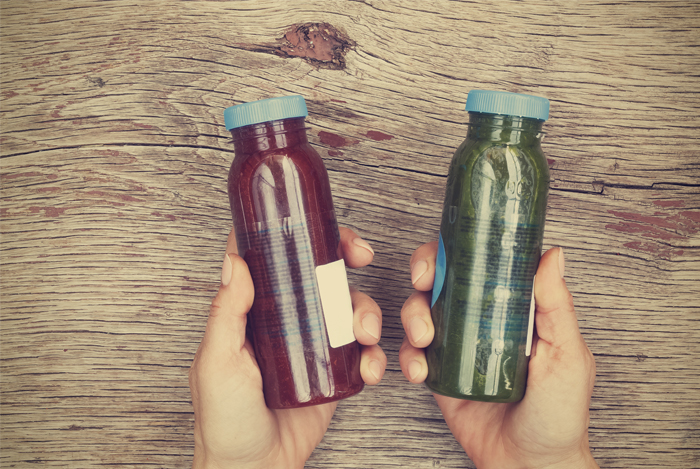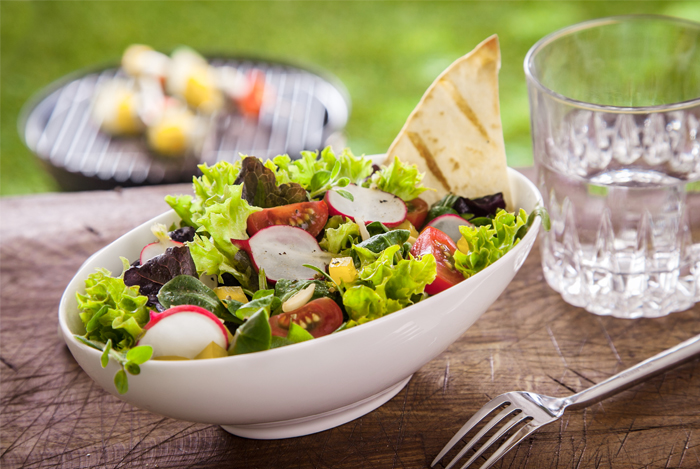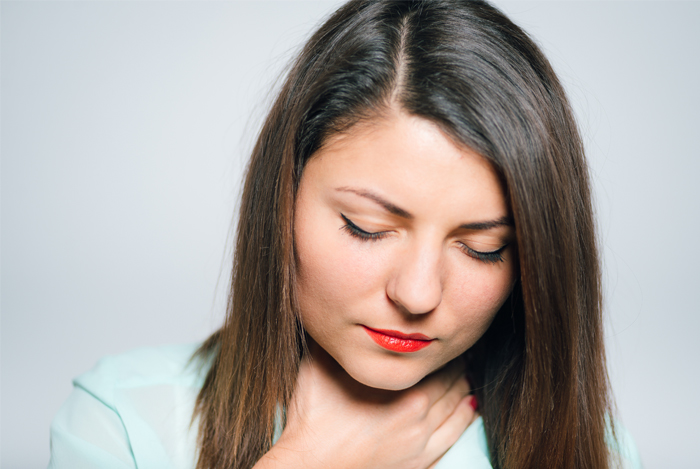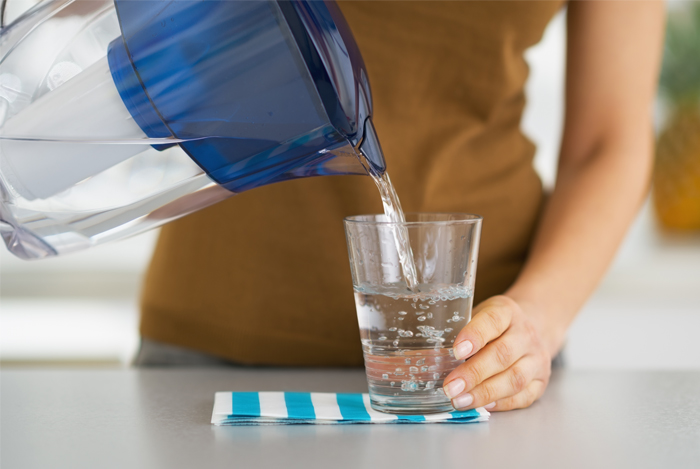By this point, you should have no doubts about how great water is for your body.
But could there be a time when you shouldn’t drink it?
For years now I’ve heard people warning against drinking anything with your meals. They say it’ll harm your digestion and possibly lead to worse health complications down the road.
Could they be right? Have we been making a terrible mistake every time we wash our food down with something as simple and healthy as high-quality H2O?
Sounds like the makings of a great investigation. Today, let’s find out if you should really be drinking liquids with your meals.
How Digestion Works

If we’re going to get to the bottom of how liquids might affect digestion, we’ll first need to take a crash course in the normal digestive process.
Digestion begins with chewing. As soon as you start to chew, your salivary glands produce saliva, which contains enzymes that break down your food. Saliva also softens your food, which enables smooth travel for your food down your esophagus and into your stomach.
Inside your stomach, food is mixed with gastric juice, an acid that breaks it down further to produce a thick liquid called chyme. Chyme is then mixed with digestive enzymes from the pancreas and bile acid from the liver once it travels to the small intestine.
This whole process serves to prepare the nutrients in your food for absorption into your bloodstream. Once inside the bloodstream, nutrients are distributed throughout the body. The digestion process ends when the leftovers leave your body.
And if you haven’t been drinking enough water, you may suffer from constipation that will… prolong the digestion process.
The Arguments for Avoiding Liquids with Meals

The idea that we should not be mixing liquids with our meals isn’t based in some strange alternative medicine practice. There’s no major issue with snake oil salesmen shouting about how nobody should drink liquids with their meals.
It’s simply based on a poor understanding of the functions of the human body. The people proclaiming you should strategically time your consumption of liquids are just trying to be helpful.
But now that we have medical science on our side to pick through every bold claim, we can get to the bottom of this issue.
So, here are the three arguments you’re most likely to run into when someone claims that liquids are bad for your digestion – and why they’re totally wrong.
Saliva is Changed by Liquids
People rallying against drinking liquids with your meals have argued that drinking alcoholic or generally acidic drinks actually dries up saliva, which makes it more difficult for the body to digest food.
There is a hint of truth to this. Alcohol decreases the flow of saliva by 10 to 15 percent per unit of alcohol. This mainly refers to hard liquors, though, and not the alcohol contents of liquids like beer and wine.
But as this is only a minor change in saliva output – and hard to reach unless you’re eating your meal with a bottle of vodka – you don’t have anything to worry about.
And acidic drinks, on the other hand, may actually increase the secretion of saliva.
Drinking Water Dilutes Stomach Acid
This argument is based on the idea that when you drink water, the stomach acid becomes too weak to break down your foods.
This would imply that the human digestive system was unable to change its secretions based on the consistency of each meal.
And that’s patently false. Drinking water in reasonable amounts with your meals does not dilute stomach acid and digestive enzymes.
Fluids Speed Up Digestion
This is one of the more popular “common sense” arguments against drinking liquid with your meals.
The idea is that fluids increase the speed at which solid foods leave the stomach, which reduces the meal’s contact time with stomach acid and digestive enzymes.
However, a study analyzing the stomach’s emptying speed found that while liquids do pass through the digestive system faster than solids, they have no effect on the digestion speed of solids.
How Liquids Can Improve Digestion

Liquids actually aid in digestion in quite a few ways.
First of all, liquids make swallowing dry or tough foods much easier. Imagine eating a big hunk of bread or a stack of crackers without some form of liquid to wash it down with!
Liquids can also break down larger chunks of food, which makes it easier for them to travel through the digestive tract. Liquids – particularly water – act as a natural lubricant for your intestinal walls and can push food along smoothly, which prevents bloating and constipation.
On top of all this, your stomach actually secretes water along with gastric acid and other digestive enzymes. Without water, these enzymes would not function properly.
In other words, liquids – water, specifically – are necessary for proper digestion and should be consumed with your meals. But improving digestion isn’t all water can do for your body when you pair it with your meals.
Benefits of Drinking Liquids with Your Meals

Water may actually help you feel fuller, so you don’t need to eat every last bite.
For one, reaching out to grab your glass of water interrupts the constant shoving of food into your mouth from your plate. The slower you eat, the more satiated you become.
And once you’ve washed down a bite, you’ll have a moment to reflect on whether or not you’re still hungry.
You can also drink water before a meal to be less hungry overall. Research has shown that people who drank 500 ml of water before each meal were able to lose an average of 4.4 lbs more than those who did not.
Other studies have found that drinking water may actually speed up your metabolism by around 24 calories per 8 oz glass you consume.
Drinking water with your meals can also keep your teeth healthy. Tap water and some bottled water brands contain fluoride, which is vital for strengthening teeth and preventing cavities.
After you eat, you can drink an extra glass of water to rinse out your mouth if you’re unable to brush your teeth. This washes away the acids from any acidic foods or beverages you consumed during your meal.
But remember, all of this research has a specific focus on water – H2O. Don’t think you can replace water with some horrible soft drink and get the same results. In fact, one study showed that overall calorie intake is much higher when people drank sugary beverages, milk, or juice with their meals.
So please, stick to water.
When Not to Drink Liquids with Meals

As you can see, drinking liquids in general – especially water – will have a positive effect on digestion in most cases. However, if you suffer from gastroesophageal reflux disease (GERD), you may run into some issues.
When you drink liquids with your meals, you add volume to the stomach. This can increase stomach pressure in much the same way as an over-large meal would. If you have GERD, this can lead to severe acid reflux.
Acid reflux occurs when your lower esophageal sphincter (LES) does not close as soon as food passes through it. Stomach acid moves up into your esophagus and wreaks havoc, which leads to burning chest pain called heartburn.
Acid reflux can also be caused – or worsened – by drinking liquids like alcohol, coffee, tea, or carbonated drinks.
So, if you deal with serious digestive issues, you should probably limit the amount of water or other liquids you consume with your meals. For everyone else, drink up.
Final Thoughts

It simply wouldn’t make any sense if our bodies had evolved to perform poorly when liquids were used to wash down solid foods.
Liquids are a part of your diet that should not be forgotten – especially during mealtimes.
According to MayoClinic.com, men should drink around 13 cups of total fluid daily. Women require around 9 cups. If you’re highly active or live in a particularly hot or dry climate, you probably need more.
Yet after saying all this, I still feel like I should caution you to not overdo it. Just because liquids help with your digestion does not mean that you should start chugging them down one after the other with your meals.
Too much water can dilute your blood, which leads to an imbalance of electrolytes that leads to a condition called hyponatremia. In hyponatremia, your body’s water levels rise, which makes your cells swell up. Such swelling can lead to numerous potentially life-threatening health problems.
If you suffer from digestion issues, don’t blame it on the liquids you drink with your meals. If anything, drink more water on a daily basis. Focus on living a healthier lifestyle in these ways:
- Exercise as often as possible.
- Adopt a well-balanced diet that includes plenty of fruits, veggies, and whole grains.
- Maintain a healthy weight.
There’s honestly no evidence showing you should avoid drinking with your meals. So, at the end of the day, whether you consume liquids during your meals is entirely up to you.
What feels best? Do you feel bloated or otherwise uncomfortable after a meal after drinking water? If so, drink less during meals – as long as you’re still getting your recommended hydration throughout the day.
If not, do your digestive system a favor and eat your food with a nice cold glass of water.
Do you drink liquids with your meals? Share your response in the comments below.
The post Should You Be Drinking Liquids with Your Meals? appeared first on Nutrition Secrets.
http://www.nutritionsecrets.com/should-you-be-drinking-liquids-with-your-meals/
No comments:
Post a Comment